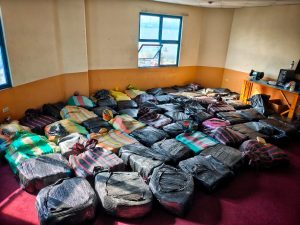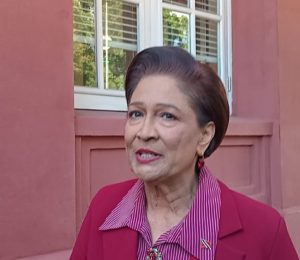By Sue-Ann Wayow
THERE have been no flu related deaths for 2020 and 2021 so far and the most plausible reason would be because of the heightened health protocols due to the Covid-19 pandemic.
The Ministry of Health is again aiming for no deaths related to the influenza virus. The flu season begins in October and ends in May next year.

On Saturday, Health Minister Terrence Deyalsingh and the health team at the ministry’s virtual press conference urged the public to avail themselves of the influenza vaccine that can be administered at any of the 109 health centres across the country.
This even as the minister said Trinidad and Tobago was “reaching a very dangerous juncture” in the fight against Covid-19 with a 50% decreased Covid-19 vaccination rate last week and a 25% increase in Intensive Care Unit (ICU) occupancy.
Deyalsingh himself took the influenza vaccine, live at the press conference.
He revealed that in 2018, the number of flu related cases were 4,598 with seven deaths. In 2019, there were 3,854 reported suspected cases and 44 deaths. In 2020 there 858 cases and no deaths.
For 2021, he said, “Because of the health protocols of wearing masks, cleanliness and so on, we had dropped to 115 suspected cases and we had no deaths.”
The minister also revealed the influenza vaccination figures.
In 2018 to 2019, the ministry administered 55,221. For the period 2019 to 2020, 118,015 vaccines for given and for 2020 to 2021, some 75,887 flu shots were done.
Deyalsingh emphasised, “What we want to keep at zero is the number of deaths.”
Two-week gap between Covid-19 and influenza vaccines
The minister explained that there was a two-week gap between the Covid-19 and the influenza vaccines and anyone over six-months-old can get an influenza shot which is administered annually.
Like Covid-19, influenza poses a respiratory problem and persons with chronic illness and breathing problems such as asthma were especially encouraged to take the vaccine along with frontline pandemic workers and pregnant women.
Deyalsingh explained, “It is a two-week window. If you plan to get your Covid vaccine, and you get your influenza vaccine today, wait before starting your Covid vaccine regime. If you already had your Covid-19 vaccine, then you wait two weeks again after you have completed a final Covid dose.”
He continued, “If you are taking your two dose Covid-19 vaccine regime and your second dose is today, wait two weeks before taking your influenza vaccine. If you take your one dose Johnson and Johnson (vaccine) today, you again wait two weeks after.”
The minister said he received his second dose of Covid-19 vaccine on July 7 so he was well passed the two-week period.
“We advise everyone if you have received your Covid vaccine two weeks and more, you are now a good candidate for receiving your flu vaccine,” he said.
While the World Health Organization (WHO) has published information regarding the co-administration of the Covid-19 and influenza vaccines, Trinidad and Tobago was being extra precautious by allowing the two-week period before administering one or the other, Deyalsingh said instead of being given both vaccines, one in each arm at the same time.
He added that in WHO’s “limited cohort” there was no report of increase or adverse effects of such type of vaccine administration.
“We are being a little bit cautious but I think being cautious has worked for us for the past year and a half,” he said.
Vaccine cost
The vaccines were procured as customary through the Pan American Health Organization (PAHO) at a cost of US$5.80 per shot.
Deyalsingh said, “In years gone by we would have gotten a trivalent vaccine, that is tri-three, that is effective against two strains of influenza A and one strain of influenza B. This year, we are introducing a quadrivalent vaccine. Four. It is effective against two strains of Influenza A and two strains of Influenza B.”
Covid-19, influenza and the common cold
On Wednesday, Chief Medical Officer Dr Roshan Parasram said both the influenza and Covid-19 virus were similar in transmission and treatments.
Dr Parasram said, “The signs and symptoms were very similar to Covid-19 and the common cold. Persons experience symptoms such as fever, cough, sore throat, runny nose, muscle aches, headaches. fatigue, and rare cases of vomiting, and diarrhea which were more common in children.”
He said it was transmitted like the Covid-19 virus between droplet infections and were inhaled when persons sneeze or when they come in contact with a contaminated surface.
Pulmonologist at the North Central Regional Health Authority (NCRHA) Dr Sana Mohammed gave further explanations of the influenza and common cold viruses on Saturday.
![]()















